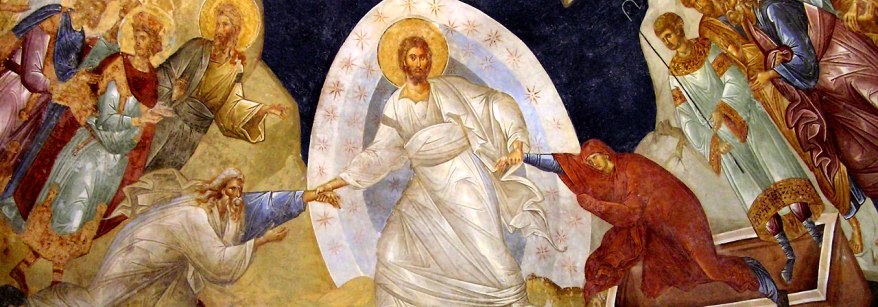
To the early Christians, Sunday was not only the first day of the week but was also symbolically the Eighth Day — the Day of Christ’s Resurrection after the “old sabbath”, when a “new creation” was made to replace the original seven day creation as described in Genesis. The concept of a new “Eighth Day” appears in the writings of many early Christian writers, such as:
Epistle of Barnabas (c. AD 80-120 )
‘Finally He saith to them; “Your new moons and your Sabbaths I cannot stand.” Ye see what is His meaning; it is not your present Sabbaths that are acceptable [unto Me], but the Sabbath which I have made, in the which, when I have set all things at rest, I will make the beginning of the eighth day which is the beginning of another world. Wherefore also we keep the eighth day for rejoicing, in the which also Jesus rose from the dead, and having been manifested ascended into the heavens.’ (Barnabas 15:8-9)
Justin Martyr (c. AD 160)
“Now, sirs,” I said, “it is possible for us to show how the eighth day possessed a certain mysterious import, which the seventh day did not possess, and which was promulgated [intimated] by God through these rites.” … “The command of circumcision, again, bidding the Jews always circumcise the children on the eighth day, was a type of the true circumcision, by which we are circumcised from deceit and iniquity through Him who rose from the dead on the first day after the Sabbath, [namely through] our Lord Jesus Christ. For the first day after the Sabbath, remaining the first of all the days, is called, however, the eighth, according to the number of all the days of the cycle, and remain the first.” … “You know, then, sirs, ” I said, “that God has said in Isaiah to Jerusalem: ‘I saved thee in the deluge of Noah.’ By this which God said was meant that the mystery of saved men appeared in the deluge. For righteous Noah, along with the other mortals at the deluge, i.e., with his own wife, his three sons, and their wives, being eight in number, were a symbol of the eighth day, wherein Christ appeared when He rose from the dead, for ever the first in power. For Christ, being the first-born of every creature, became again the chief of another race regenerated by Himself through water, and faith, and wood, containing the mystery of the cross; even as Noah was saved by wood when he rode over the waters with his household.” (Dialogue with Trypho 24;41;138)
Clement of Alexandria (c. 190)
‘And the Lord’s day Plato prophetically speaks of in the tenth book of the Republic in these words: “And when seven days have passed to each of them in the meadow, on the eighth they are to set out and arrive in four days.” By the meadow is to be understood the fixed sphere, as being a mild and genial spot, and the locality of the pious; and by the seven days each motion of the seven planets, and the whole practical art which speeds to the end of rest. But after the wandering orbs the journey leads to heaven, that is, to the eighth motion and day. (The Stromata, Book 5, 14; Book 4, 25: Book 6, 6)
Tertullian (c. AD 200)
‘To the heavens each festive day occurs but once annually: you have a festive day every eighth day. (On Idolatry 9)
Cyprian (c. AD 250)
‘For in respect of the observance of the eighth day of the Jewish circumcision of the flesh, a sacrament was given beforehand in shadow and in usage; but when Christ came, it was fulfilled in truth. For because the eighth day, that is, the first day after the Sabbath, was to be that on which the Lord should rise again, and should quicken us, and give us circumcision of the spirit, the eighth day, that is the first day after the Sabbath, and the Lord’s Day, went before in the figure; which figure ceased when by and by the truth came and spiritual circumcision was given to us (Letter 58, 4)
Origen (c.250)
‘Before the arrival of the eighth day of the Lord Jesus Christ the whole world was pure and uncircumcised. But when the eighth day of the resurrection came, immediately we were cleansed, buried, and raised by the circumcision of Christ.’ (Selecta in Psalmos 118)
Methodius of Olympus (c. AD 290)
‘To those who lived after the deluge the knowledge of God was henceforth more remote, and they needed other instruction to ward off the evil, and to be their helper, since idolatry was already creeping in. Therefore God, that the race of man might not be wholly destroyed, through forgetfulness of the things which were good, commanded His own Son to reveal to the prophets His own future appearance in the world by the flesh, in which the joy and knowledge of the spiritual eighth day shall be proclaimed, which would bring the remission of sins and the resurrection, and that thereby the passions and corruptions of men would be circumcised. And, therefore, He called by the name of the eighty virgins the list of prophets from Abraham, on account of the dignity of circumcision, which embraces the number eight, in accordance with which also the law is framed; because they first, before the Church was espoused to the Word, received the divine seed, and foretold the circumcision of the spiritual eighth day. (Discourse 7, Procilla, 6)
